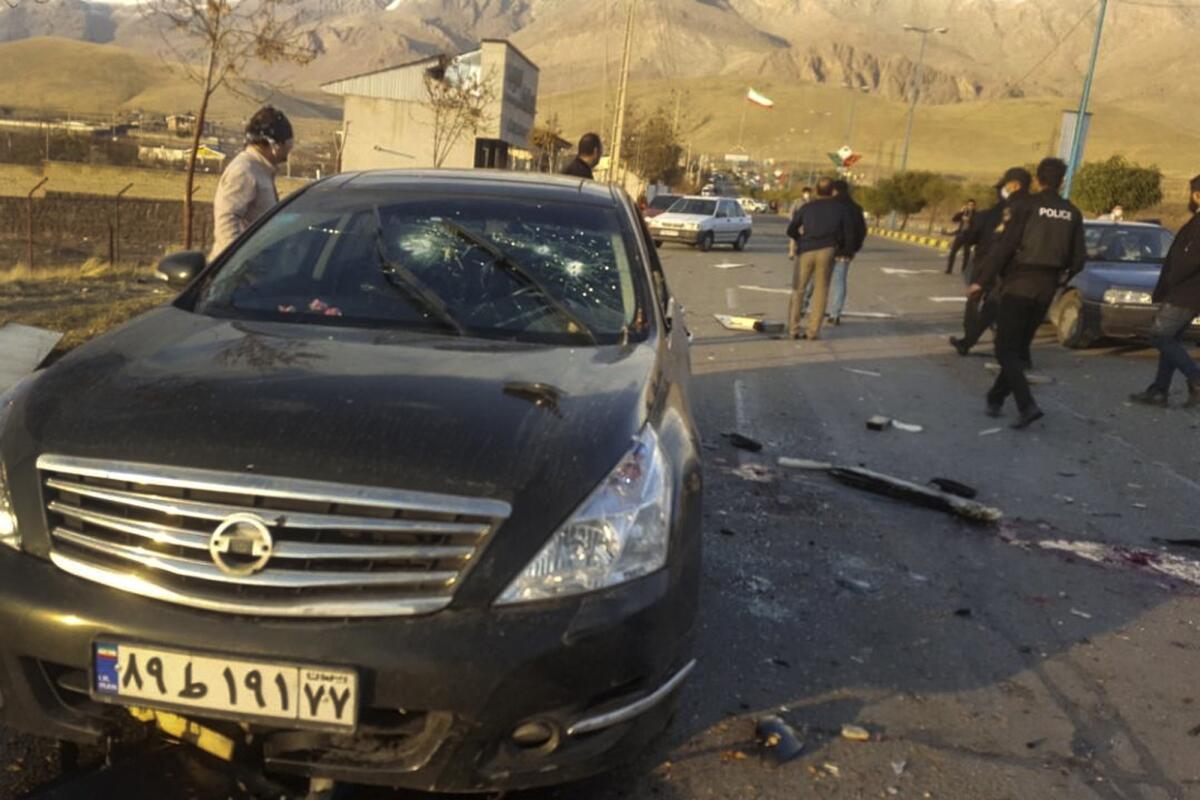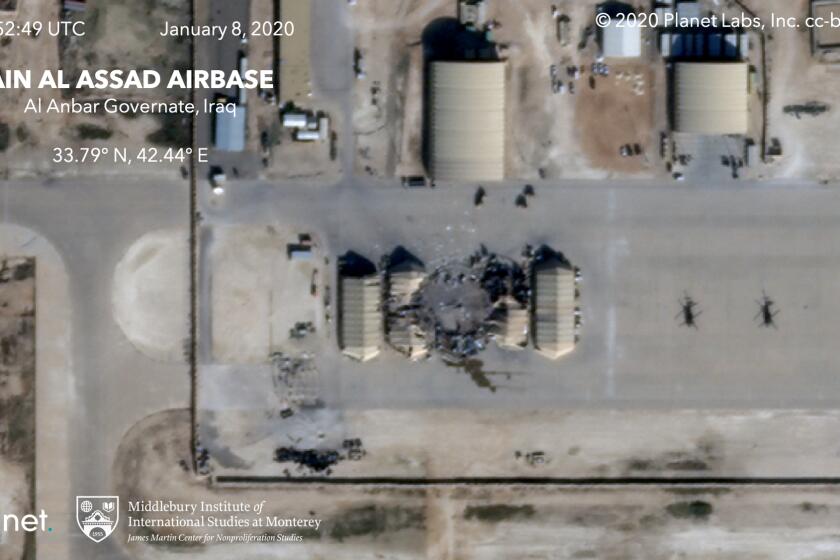Iran under intense pressure over how to respond to top scientist’s brazen killing

- Share via
BEIRUT — The U.S. drone missile punched through the car of Iranian Gen. Qassem Suleimani, instantly killing the 62-year-old Iranian spymaster and national hero as he drove through the streets of Baghdad in January.
Days later, Iranian leaders who swore “severe revenge” lobbed ballistic missiles at a U.S. base in Iraq, leaving scores of American service members and contractors with traumatic brain injuries. The Islamic Republic also mobilized its irregular forces, including Iran-supported militias in Iraq, which regularly fired rockets at the U.S. Embassy and bases with American troop presence.
Now, Iran finds itself the target of another attack, this time the broad-daylight assassination on Friday of Mohsen Fakhrizadeh-Mahabadi, one of Iran’s top nuclear scientists.
The killing, by what many believed was a U.S.-sanctioned Israeli hit team, has ratcheted up the pressure on Iran’s leaders for vengeance again.
But a similar response, analysts say, could result in a precarious situation at a time when Iran is eagerly counting the days to the inauguration of U.S. President-elect Joe Biden, who may well be amenable to bringing the United States back into the international nuclear treaty with Iran that President Trump pulled out of while imposing tough new economic sanctions.
Reacting lethally to the killing, said Ellie Geranmayeh, an Iran expert and deputy head of the Middle East and North Africa program at the European Council on Foreign Relations, could box Biden in as he takes office — or even result in a military conflagration in the waning days of Trump’s tenure.
“The Iranians are aware that there are mines set for them,” Geranmayeh said, referring to the Joint Comprehensive Plan of Action, the landmark 2015 nuclear deal that Trump left in 2018. “This is exactly the playbook that proponents of maximum pressure have been trying to advocate: that there need to be moves that make it much more difficult for Biden to reenter the deal and for Iran to engage the U.S. in diplomacy.”
As a result, the government of Iranian President Hassan Rouhani must balance internal voices demanding vengeance even as it hopes to weather the seven weeks until Biden is sworn in.
On Friday afternoon, as Iranians were enjoying the first day of their weekend amid coronavirus restrictions, Fakhrizadeh was in a car heading down a highway near the resort town of Absard, some 35 miles east of Tehran. There, a car loaded with explosives blew up, and gunmen descended on Farkhizadeh, cutting him down along with members of his security detail.
In its brazenness, the killing echoed other car bombings and motorcycle assassinations targeting Iran’s nuclear scientists. All have been part of a decade-long effort by Israel and the U.S. to hinder Tehran’s nuclear ambitions, analysts say.
Fakhrizadeh’s assassination followed a series of mysterious explosions at Iran’s Natanz nuclear facility in July (authorities blamed sabotage; they have yet to reveal who they believe was behind it) as well as the operation targeting Suleimani while he was abroad.
Troops were on lockdown at the base housing U.S. soldiers in western Iraq hours before it was struck by a barrage of Iranian ballistic missiles.
A U.S. return to the nuclear accord — and the sanctions relief it may bring — is a priority for Iran. Over the last four years, sanctions have cratered its currency, cut off its economy from world markets and left its 82 million people facing poverty.
Retired Navy Adm. William McRaven, in an interview Sunday on ABC’s “This Week,” urged everyone involved to “kind of lower the temperature.”
“The Iranians don’t want war with us. We don’t want to go to war with Iran,” said McRaven, who as head of U.S. special operations forces oversaw the 2011 raid that killed Osama bin Laden.
But, he said, “the Iranians are going to be in a position where they have to retaliate — I don’t see any way around it.”
So far, Iran’s leadership appears to have chosen the path of restraint.
In a televised Cabinet meeting Saturday, Rouhani said Iran would “respond to this crime at the proper time.”
“But the Iranian nation is wiser and smarter than to fall in the trap of the Zionists,” he said, in reference to Israel.
Iran’s Supreme Leader Ayatollah Ali Khamenei said in an English-language Twitter post that “all relevant administrators must seriously place two crucial matters on their agenda: first to investigate this crime and firmly prosecute its perpetrators and its commanders, second to continue the martyr’s scientific and technological efforts in all the sectors where he was active.”
Meanwhile, the country’s parliament passed a motion that would require Iran’s Atomic Energy Organization to produce and store at least 264 pounds of uranium with 20% purity. If ratified, it would be another step in the methodical breaches of the nuclear deal that Tehran has pursued since Trump pulled out of the treaty.
Still, there have been voices advocating a more forceful response, said Dina Esfandiary, a fellow at the Century Foundation, a nonpartisan think tank.
“The Rouhani administration understands there’s value in not escalating, in appearing strong but appearing reasonable,” she said.
“But there are pressures from hard-liners as well as moderates, who are fed up and saying: ‘Why are we just taking this? Why are we the ones respecting international norms when nobody else is?’”
And politically, there are factions within Iran that want to scuttle the reentry into the nuclear deal, said Ariane Tabatabai, a Middle East fellow at the policy organization the German Marshall Fund — if only to stop Rouhani claiming any achievement before the presidential election in June.
“If the U.S. rejoins the JCPOA and economic relief starts to come in, then Rouhani can leave office with some sort of accomplishment,” Tabatabai said. “If they deny him this win, hard-liners have an easier and clearer path to victory.”
The assassination was a humiliation for Iran’s security apparatus. After all, Fakhrizadeh — like Suleimani — was an officer in the country’s elite Revolutionary Guard, and was presumably under its protection.
He had proved to be an elusive figure since a spate of assassinations between 2010 and 2012 struck four of his colleagues. (He survived an assassination attempt in 2008.)
Iranian authorities reportedly beefed up security around him and refused to make him available to the International Atomic Energy Agency. Despite those measures, he was killed, tweeted Maj. Gen. Mohammad Bagheri, chief of staff of Iran’s armed forces, in what constituted “a bitter and heavy blow to the country’s defense system.”
That blow could usher in new urgency to procure a nuclear weapon, Tabatabai said.
“It shows that at the end of the day when it comes to its most basic security issues, the regime is not in a spectacular place,” she said. “It’s in the realm of possibility that it may accelerate the program — thus the opposite of what Israel had tried to achieve.”
Internationally, the assassination has elicited condemnation from international officials and calls for restraint.
“A few weeks before the new U.S. administration takes office, it is important to preserve the scope for talks with Iran so that the dispute over Iran’s nuclear program can be resolved through negotiations,” a spokesman for the German Foreign Ministry said in a statement. “We therefore urge all parties to refrain from any steps that could lead to a further escalation of the situation.”
It was a sentiment echoed by United Nations Secretary-General Antonio Guterres, who urged restraint to avert an escalation of tensions, according to a statement from his spokesman to Reuters on Friday.
In the U.S., John Brennan, who headed the CIA between 2013 and 2017, blasted the assassination in a series of tweets on Friday, saying it was a “criminal act” that constituted a “flagrant violation of international law.”
“Iranian leaders would be wise to wait for the return of responsible American leadership on the global stage and to resist the urge to respond against perceived culprits,” he tweeted.
Whatever course of action Iran’s leaders choose, there is little doubt Biden will face a difficult situation after Inauguration Day.
“This is going to complicate President Biden’s ... diplomatic efforts,” McRaven said.
Under longstanding political norms, most outgoing presidents do not seek to limit their successor’s maneuvering room, said retired Adm. Michael G. Mullen, former head of the Joint Chiefs of Staff.
“You’d like to do all you can to not box in the president — to give any president as many options and as much space as possible,” Mullen said on NBC’s “Meet the Press.” “So, this is obviously the opposite case right now.”
“A lot of what Rouhani can do,” Geranmayeh said, “depends on how quickly and seriously the Biden administration pivots toward diplomacy with Iran. The ball is in the court of the Biden camp to make the first move on that front.”
Times staff writer Laura King in Washington contributed to this report.
More to Read
Sign up for Essential California
The most important California stories and recommendations in your inbox every morning.
You may occasionally receive promotional content from the Los Angeles Times.












